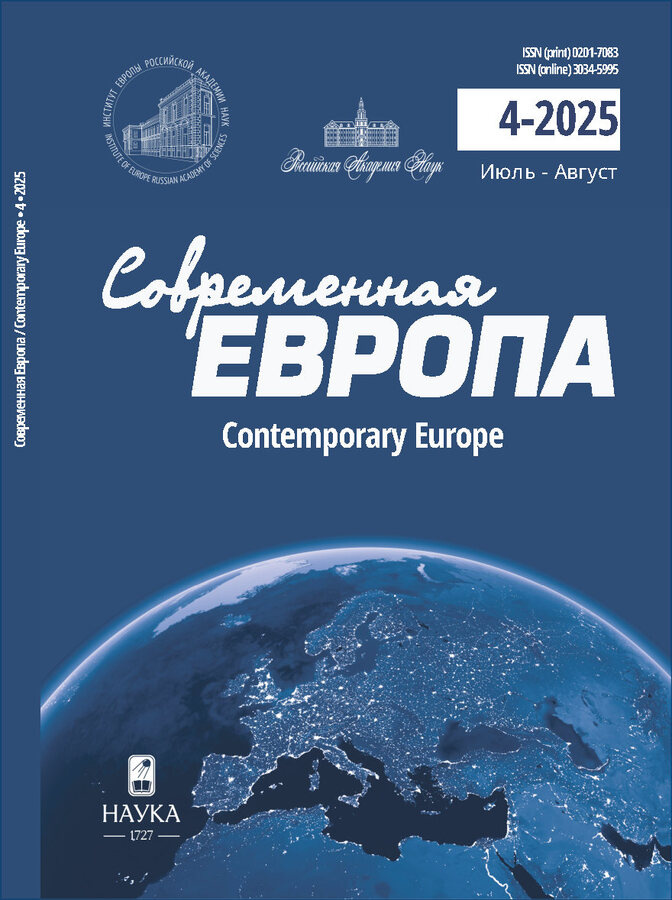Are the EU Energy Sanctions against Russia Rational?
- Authors: Borovskiy Y.V1
-
Affiliations:
- Moscow State Institute of International Relations (MGIMO-University)
- Issue: No 4 (132) (2025)
- Pages: 41-51
- Section: САНКЦИОННАЯ ПОЛИТИКА
- URL: https://kazanmedjournal.ru/0201-7083/article/view/691003
- DOI: https://doi.org/10.31857/S0201708325040047
- ID: 691003
Cite item
Abstract
The article examines the rationality of the European Union's anti-Russian energy sanctions imposed after the start of Russia's Special Military Operation. Methodologically, the research relies on system, historical and comparative analysis, as well as discourse analysis. It is also based on the fundamental concepts of the theory of international relations. The irrationality of the EU is seen in the fact that, due to harsh energy sanctions, it has not only failed to influence Moscow's policy, but has also caused significant damage to its own economy and the welfare of its citizens. However, the article concludes that the affordability of energy supply is only one side of the energy trilemma. By refusing to import relatively cheap Russian fossil fuels, the EU may act quite rationally, since it prioritized safe and at the same time sustainable energy supply, including with an eye to a fundamental transformation of its economic model in the coming decades. As for realism and liberalism, the EU's anti-Russian energy sanctions may also seem rational. In the first case, the EU, by imposing energy sanctions against Russia, could keep a geopolitical rivalry and the competition for a new world order in mind. In the second case, it could sacrifice mutually beneficial energy cooperation for the sake of its liberal ideals. The main conclusion is that it is more correct not to associate the EU’s energy sanctions imposed on Russia only with irrationality, but also to try to see a different rationality in them.
Keywords
About the authors
Yu. V Borovskiy
Moscow State Institute of International Relations (MGIMO-University)
Email: yuribor@mail.ru
Doctor of Sciences (History), Head of the Department of International Relations and Foreign Policy of Russia Moscow, Russia
References
- Боровский Ю.В. (2023) Чем движим Запад в своей энергетической политике? Международные процессы. Т. 21. № 1(72). С. 189–211. DOI: https://doi.org/10.17994/IT.2023.21.1.72.4
- Боровский Ю.В. (2024) Понимание энергетической безопасности ключевыми центрами силы (Россия, КНР, США, ЕС). Сравнительная политика. Т. 15. № 2. С. 11–30. DOI: https://doi.org/10.46272/2221-3279-2024-2-15-1
- Кавешников Н.Ю. (2015) «Невозможная триада» энерroбезопасности Европейского союза. Международные процессы. Т. 13. № 4. С. 74–85. DOI: https://doi.org/10.17994/IT.2015.13.4.43.5
- Кавешников Н.Ю. (2024) «Зеленый курс» как триггер углубления интеграции в Европейском союзе. Мировая экономика и международные отношения. Т. 68. № 6. С. 93–107. DOI: https://doi.org/10.20542/0131-2227-2024-68-6-93-107
- Кувалдин С.А. (2020) Ценности ЕС и их защита в европейском законодательстве. Современная Европа. № 7(100). С. 37–45. DOI: https://doi.org/10.15211/soveurope720203745
- Спартак А.Н., Чеклина Т.Н. (2023) Торгово-экономическое сотрудничество России со странами Европы до и после начала специальной военной операции. Российский внешнеэкономический вестник. № 2. С. 8–46. DOI: http://dx.doi.org/10.24412/2072-8042-2023-2-8-46
- Стрежнева М.В. (2016) Субъектность Евросоюза в отражении организационной теории. Международные процессы. Т. 14. № 1. С. 63–76. DOI: http://dx.doi.org/10.17994/IT.2016.14.1.44.5
- Халова Г.О., Гришина В.О. (2023) Влияние антироссийских санкций в энергетике на экономику ЕС. Проблемы экономики и управления нефтегазовым комплексом. № 5. С. 43–48. DOI: http://dx.doi.org/10.33285/1999-6942-2023-5(221)-43-48
- Юдина О.Н. (2023) Энергетический вызов безопасности ЕС. Невоенные угрозы безопасности ЕС. Под ред. Н.К. Арбатовой, А.М. Коксева, Е.Г. Черкасовой. ИМЭМО РАН; Весь мир, Москва. С. 321–426.
- Batzella F. (2024) Slowly but surely? Assessing EU actorness in energy sanctions against Russia. Energy Policy. Vol. 192. DOI: https://doi.org/10.1016/j.enpol.2024.114233
- Luft G., Korin A. (2009). Realism and Idealism in the Energy Security Debate. Energy Security Challenges for the 21st Century: A Reference Handbook. Ed. by G. Luft, A. Korin. Praeger, Santa Barbara, USA. P. 335–349.
- Perdana S., Vielle M., Schenckery M. (2022) European economic impacts of cutting energy imports from Russia: A computable general equilibrium analysis. Energy Strategy Reviews. Vol. 44. DOI: https://doi.org/10.1016/j.esr.2022.101006
- Yangyang C., Jiexin J., Lei W., Ruisong W. (2023) Impact assessment of energy sanctions in geo-conflict: Russian-Ukrainian War. Energy Reports. No. 9. P. 3082–3095. DOI: https://doi.org/10.1016/j.egyr.2023.01.124
Supplementary files










